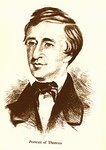At the present day, and in this country, as I find by my own experience, a few implements, a knife, an axe, a spade, a wheelbarrow, etc., and for the studious, lamplight, stationery, and access to a few books, rank next to necessaries, and can all be obtained at a trifling cost. Yet some, not wise, go to the other side of the globe, to barbarous and unhealthy regions, and devote themselves to trade for ten or twenty years, in order that they may live -- that is, keep comfortably warm -- and die in New England at last. The luxuriously rich are not simply kept comfortably warm, but unnaturally hot; as I implied before, they are cooked, of course a la mode.
Most of the luxuries, and many of the so-called comforts of life, are not only not indispensable, but positive hindrances to the elevation of mankind. With respect to luxuries and comforts, the wisest have ever lived a more simple and meager life than the poor.
The ancient philosophers, Chinese, Hindu, Persian, and Greek, were a class than which none has been poorer in outward riches, none so rich in inward. We know not much about them. It is remarkable that we know so much of them as we do. The same is true of the more modern reformers and benefactors of their race. None can be an impartial or wise observer of human life but from the vantage ground of what we should call voluntary poverty.
Of a life of luxury the fruit is luxury, whether in agriculture, or commerce, or literature, or art. There are nowadays professors of philosophy, but not philosophers. Yet it is admirable to profess because it was once admirable to live.
To be a philosopher is not merely to have subtle thoughts, nor even to found a school, but so to love wisdom as to live according to its dictates, a life of simplicity, independence, magnanimity, and trust. It is to solve some of the problems of life, not only theoretically, but practically.
The success of great scholars and thinkers is commonly a courtier-like success, not kingly, not manly. They make shift to live merely by conformity, practically as their fathers did, and are in no sense the progenitors of a noble race of men. But why do men degenerate ever?
Thursday, April 26, 2007
Subscribe to:
Post Comments (Atom)



No comments:
Post a Comment